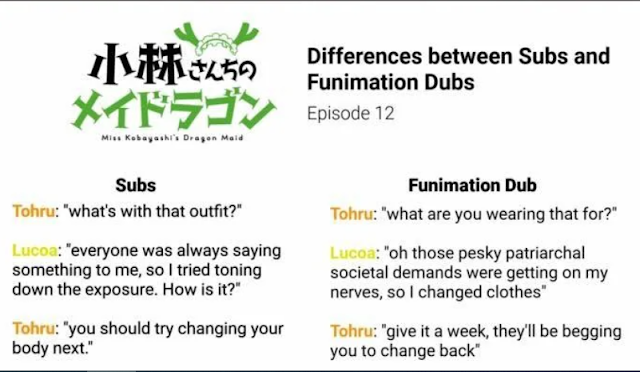 |
| Comparison of text between the Japanese (original) and American versions of the game Legend of Zelda: Breath of the Wild |
The issue with localization in anime and video games
Japan is known for producing high-quality animation (anime) and video games. As such, it is little wonder that there is a demand for subtitling (subbing) and dubbing into different languages.
Japan is known for producing high-quality animation (anime) and video games. As such, it is little wonder that there is a demand for subtitling (subbing) and dubbing into different languages.
However, one of the challengers of translation is that sometimes the Japanese phrases do not translate well outside Japan. For instance, our Japanese friends tend to use the words like "senpai", and honorifics like "-san" and "-chan" that are uniquely Japanese. Thus there is a need to do localization, which is to translate the Japanese words to suit the audience's culture. For instance in the game Legend of Zelda: Skyward Sword, the shopping district in is translated from "shoppu moru" to "bazaar" as it does resemble a street market in most countries.
Localization controversy
Recently, Japanese-to-English localizers has come under fire for refusing to translate according to the original author's intention.
Recently, Japanese-to-English localizers has come under fire for refusing to translate according to the original author's intention.
The controversy first gained traction when the American audience noted the difference between the subtitles (which were more literal to the Japanese text) and the dubs in the anime Miss Kobayashi's Dragon Maid.
 |
| The change from the text in Miss Kobayashi's Dragon Maid |
In another example, the person in charge of dubbing the anime Lovely Complex took pride that his localization deliberately took liberties with the text against the author's intent, with the statement, "We made it good. This show SUCKED!".
Such liberties usually seem to conform to a typical California left-wing politics, rather than an international audience, or even the general American audience. These include and not limited to uncalled criticism of capitalism, unhinged hatred of males, sudden claims of patriarchy and insertion of LGBT ideology or pronouns when the original Japanese did not even allude to it. I attached a video below to show how inappropriate the localization can be in video games.
What this means for Christians?
Be wary of inserting our own desires into the Bible
Be wary of inserting our own desires into the Bible
Now whether we Christians should think such localizations are right and wrong is not the point I want to discuss for part of the post.
What I want to discuss for this post is like whether we tend to localize Scripture to our interest, rather than allowing the God's intent to be read.
Do your best to present yourself to God as one approved, a worker who has no need to be ashamed, rightly handling the word of truth. - 2 Timothy 2: 15
By rightly handling, this means doing the research, and not inserting our own politics, interpreting things to our favor and detouring from the original text and intent. I have seen happen (whether intentionally or unintentionally) many times.
After all, no one seriously interprets God's instruction to the prophet Hosea to marry an unfaithful woman as a command to all Christian to do so. Similarly, we should not take verses like the one below:
For I know the plans I have for you, declares the Lord, plans for welfare and not for evil, to give you a future and a hope. - Jeremiah 29: 11
as a prediction that God always prosper us as it was a specific instruction for Jeremiah.
Dangers with translation of the Bible
I warn everyone who hears the words of the prophecy of this book: if anyone adds to them, God will add to him the plagues described in this book, and if anyone takes away from the words of the book of this prophecy, God will take away his share in the tree of life and in the holy city, which are described in this book. - Revelations 22: 18-19
I warn everyone who hears the words of the prophecy of this book: if anyone adds to them, God will add to him the plagues described in this book, and if anyone takes away from the words of the book of this prophecy, God will take away his share in the tree of life and in the holy city, which are described in this book. - Revelations 22: 18-19
Another lesson we can take from the localization controversy is the lesson to localize or translate the Bible seriously. I appreciate the translators of the Bible for making the text available to everybody as learning the original Greek and Hebrew (in addition to the context) would not be accessible.
Nevertheless, I think even for the Message translation (by Eugene Peterson) which takes great liberties with the text, I never got the sense that Peterson hated the original material unlike some of the anime and video game localizers.
Conclusion
The localization controversy should encourage Christians also to closely examine on how they interpret the Bible.
The localization controversy should encourage Christians also to closely examine on how they interpret the Bible.
For more information:

No comments:
Post a Comment